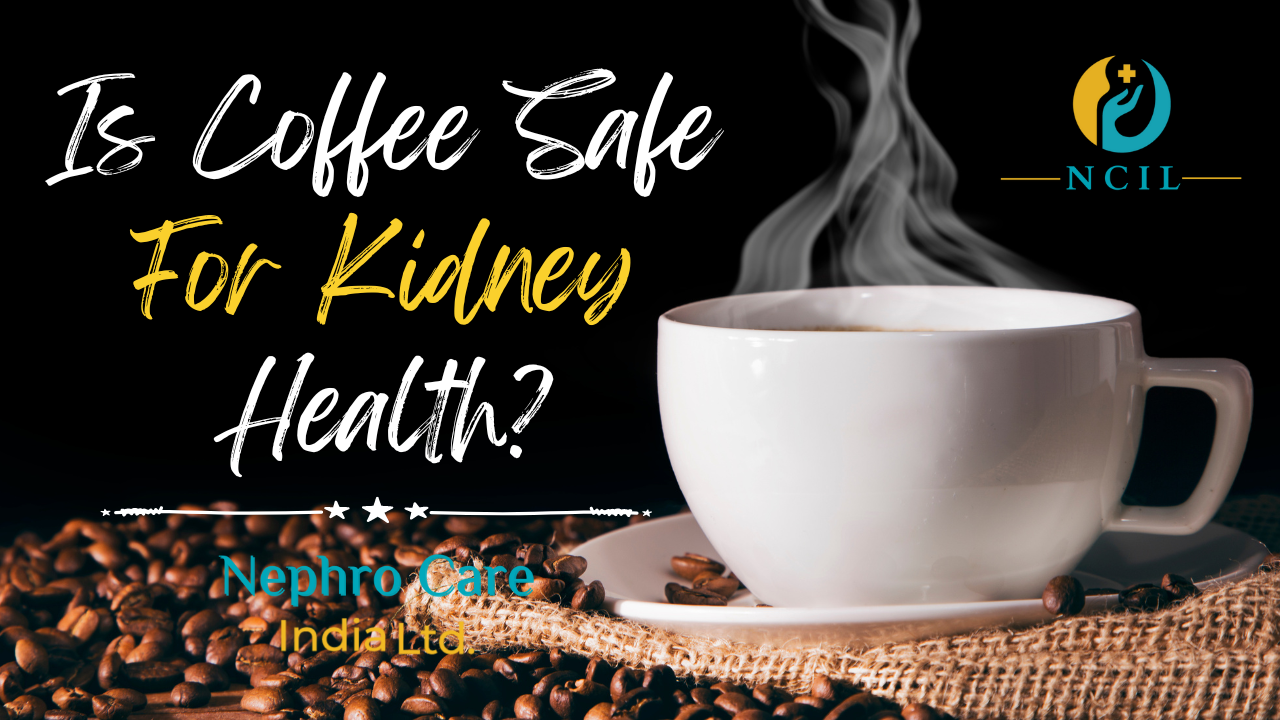
Coffee is one of the most widely consumed beverages across the world, enjoyed for its energy-boosting effects and aromatic flavor. However, there has been ongoing debate about its health implications, particularly regarding kidney health. This blog delves into the relationship between coffee and kidney disease and its impact on health.

Numerous studies have examined the connection between coffee consumption and kidney function. One significant study, published in the Clinical Journal of the American Society of Nephrology, revealed that moderate coffee intake is linked to a decreased risk of chronic kidney disease (CKD). The study was based on analyzed data from over 2,600 participants and decided that individuals who consumed one to two cups of coffee daily had a lower risk of CKD than non-coffee drinkers.

Additionally, research published in the American Journal of Kidney Diseases corroborated these results, showing that coffee drinkers had a lower incidence of albuminuria, a marker of kidney damage. This suggests that coffee may offer protective benefits for kidney function.
Caffeine, the key active compound in coffee, has been extensively studied for its impact on kidney health. According to research, moderate caffeine intake (200-300 mg daily) is generally safe for the kidneys. However, consuming caffeine in excess of 500 mg per day may elevate the risk of kidney stones and exacerbate kidney function in individuals with existing kidney issues.

Moreover, caffeine has diuretic properties, which means it can increase urine production. Although this effect is generally mild, it can lead to dehydration if not compensated by adequate fluid intake. Dehydration, in turn, can put additional stress on the kidneys, particularly in individuals with existing kidney disease.
Coffee is rich in antioxidants, which play a significant role in protecting the kidneys from oxidative stress and inflammation. A study published in Kidney International Reports highlighted the benefits of coffee’s antioxidant content. The researchers found that polyphenols, a type of antioxidant found in coffee, can help reduce inflammation and oxidative damage in kidney cells. This protective effect is especially important for individuals with CKD, as oxidative stress is a key factor in the progression of kidney damage.

In another study, the presence of chlorogenic acid, another potent antioxidant in coffee, was linked to improved kidney health. The research, published in Nutrients, showed that chlorogenic acid helps reduce blood pressure and improves endothelial function, both of which are beneficial for kidney health.

While moderate coffee consumption can have benefits, it is also essential to consider potential risks, especially for individuals with existing kidney disease. A review published in Nephrology Dialysis Transplantation discussed that for patients already suffering from advanced CKD or those undergoing dialysis, high potassium levels in coffee are a matter of concern and could pose a risk. Hyperkalemia, a condition with the rise in potassium levels, usually can be dangerous for these patients, and they are often advised to limit their intake of high-potassium foods and beverages, including coffee.

Excessive caffeine intake also disturbs sleep. Those suffering from insomnia should reduce their intake of caffeine or coffee. Less sleeping hours for prolong time could have adverse effect on health. It results in cardiac dysfunction and blood pressure which in turn might affect the proper functioning of our Kidneys.

Consuming excessive coffee might also reduce the production of insulin in our body, which over time increases the chances of diabetes. India won the diabetic capital of the world. Diabetes being the leading cause of Kidney Disease defines a clear picture of the relationship between Coffee and Kidney Disease.

Completing a successful transplant should relax your previous potassium restriction. Your dietitian and doctor can further advise you to limit high-potassium foods depending on the level of potassium in your blood.
To know more about maintaining a healthy and balanced diet, please join our WhatsApp group

Furthermore, some studies suggest that additives commonly used along with coffee, such as cream and sugar, can negatively impact kidney health. Excessive sugar consumption can lead to obesity and diabetes, both of which are major risk factors for CKD. Therefore, experts recommend consuming coffee in its purest form, without excessive additives.
The link between coffee consumption and kidney disease is intricate and multi-dimensional. Studies indicate that drinking coffee in moderation may provide protective effects for the kidneys. This is largely due to its high antioxidant levels. Nonetheless, people with existing kidney issues should be mindful of their coffee intake, especially concerning caffeine and potassium. It is essential to consult healthcare providers to determine what is best for individual health requirements.
Good to know that consuming coffee at moderate amount is beneficial for ckd patient as coffee has antioxident value keeping in in mind the potassium level inthe blood .
Thank you for your insightful comment! Indeed, consuming coffee in moderation can be beneficial due to its antioxidant properties. However, CKD patients must monitor their potassium levels and consult their dietician for personalized advice. Stay tuned for more updates on health-related blogs at https://www.drpratim.com/blogs/.
2024-07-25 02:42:39
Md.Abdul Alim Bhuiyan
Very good information regarding coffee drinks. Could you please tell me daily a cup (200-250) ml co black coffee is good or bad for CKD patient.
For CKD patients with serum creatinine lower than 1.2, having one cup of black coffee once or twice a week is generally considered safe. However, since coffee is rich in potassium, CKD patients with hyperkalemia or in stage 3 or beyond should avoid it. After a renal transplant, it's crucial to monitor potassium levels and consult your healthcare provider for personalized advice. Stay tuned for more updates on health-related blogs at https://www.drpratim.com/blogs/.